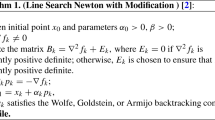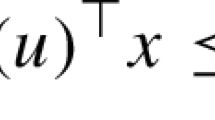Abstract
In this paper, reference variable methods are proposed for solving nonlinear Minmax optimization problems with unconstraint or constraints for the first time, it uses reference decision vectors to improve the methods in Vincent and Goh (J Optim Theory Appl 75:501–519, 1992) such that its algorithm is convergent. In addition, a new method based on KKT conditions of min or max constrained optimization problems is also given for solving the constrained minmax optimization problems, it makes the constrained minmax optimization problems a problem of solving nonlinear equations by a complementarily function. For getting all minmax optimization solutions, the cost function f(x, y) can be constrained as M 1 < f(x, y) < M 2 by using different real numbers M 1 and M 2. To show effectiveness of the proposed methods, some examples are taken to compare with results in the literature, and it is easy to find that the proposed methods can get all minmax optimization solutions of minmax problems with constraints by using different M 1 and M 2, this implies that the proposed methods has superiority over the methods in the literature (that is based on different initial values to get other minmax optimization solutions).
Similar content being viewed by others
References
Shi D.S. and Ling C. (1995). Minmax theorems and cone saddle point of uniformly same -order vector valued functions. J. Optim. Theory Appl. 84(3): 575–587
Greco G.H. and Horvath C.D. (2002). A topological minimax theorem. J. Optim. Theory Appl. 113(3): 513–536
Frenk J.F.B. and Kassay G. (2002). Minimax results and finite-dimensional separation. J. Optim. Theory Appl. 113(2): 409–421
Ghosh M.K., McDonald D. and Sinha S. (2004). Zero-sum stochastic games with partial information. J. Optim. Theory Appl. 121(1): 99–118
Frenk J.B.G., Kassay G. and Kolumban J. (2004). On equivalent results in minmax theory. Eur. J. Oper. Res. 157: 46–58
Achtziger W. (1998). Multiple local truss topology and sizing optimization some properties of minmax compliance. J. Optim. Theory Appl. 98(2): 255–277
Tan K.K. and Yu J. (1994). New minmax inequality with applications to existence theorems of equilibrium point. J. Optim. Theory Appl. 82(1): 105–120
Polak E. and Royset J.O. (2003). Algorithms for finite and semi-infinite min–max–min problems using adaptive smoothing techniques. J. Optim. Theory Appl. 119(3): 421–457
Polak E. and Royset J.O. (2003). Algorithms with adaptive smoothing for finite minimax problems. J. Optim. Theory Appl. 119(3): 459–484
Yu Y.H. and Gao L. (2002). Nonmonotone line search algorithm for constrained minimax problems. J. Optim. Theory Appl. 115(2): 419–446
Yu G. (1998). Min–max optimization of several classical discrete optimization problems. J. Optim. Theory Appl. 98(1): 221–242
Frenk J.B.G., Gromicho J. and Zhang S. (1996). General models in minmax continuous localtion theory and solution thechniques. J. Optim. Theory Appl. 89(1): 39–63
Vincent T.L. and Goh B.S. (1992). Trajectory-following algorithms for min–max optimization problem. J. Optim. Theory Appl. 75(3): 501–519
Fischer A. (1998). New constrained optimization reformulation of complementarity problems. J. Optim. Theory Appl. 97(1): 105–117
Pu D. and Tian W. (2002). Globally convergent inexact generalized Newton’s methods for nonsmooth equations. J. Comput. Appl. Math. 138: 37–49
Neumaier A. (2001). Introduction to numerical analysis. New York Cambridge university press, Cambridge UK
Hernandez M.A. and Rubio M.J. (2004). A modification of Newton’s method for non-differentiable equations. J. Comput. Appl. Math. 164–165: 409–417
Amat S., Busquier S. and Gutierrez J.M. (2003). Geometric constructions of iterative functions to solve nonlinear equations. J. Comput. Appl. Math. 157: 197–205
Xiaojun C. (1997). Superlinear convergence of smoothing quasi-Newton methods for non-smooth equations. J. Comput. Appl. Math. 80: 105–126
Xu J.-j. (1999). Convergence of partially asynchronous block quasi-Newton methods for nonlinear systems of equations. J. Comput. Appl. Math. 103: 307–321
Andreas F. (1995). Asynchronous parallel for enclosing solutions of nonlinear equations. J. Comput. Appl. Math. 60: 47–62
Author information
Authors and Affiliations
Corresponding author
Rights and permissions
About this article
Cite this article
Lu, B., Cao, Y., Yuan, M.j. et al. Reference variable methods of solving min–max optimization problems. J Glob Optim 42, 1–21 (2008). https://doi.org/10.1007/s10898-007-9191-8
Received:
Accepted:
Published:
Issue Date:
DOI: https://doi.org/10.1007/s10898-007-9191-8




